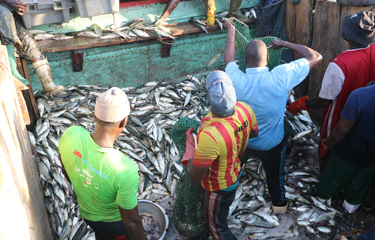The Coalition for Fair Fisheries Arrangement (CFFA) said it has doubts regarding the credibility of a recent report showcasing the progress made by the small pelagics fishery improvement program (FIP) in Mauritania.
The CFFA describes itself as a platform of NGOs based in Brussels, Belgium, that "documents the development and environmental impacts of European Union, African, Caribbean, and Pacific states' fisheries relations on small-scale fishing communities."
The CFFA’s concerns came after French multinational company Olvea Group announced it was awarded an “A grade” by the Sustainable Fisheries Partnership (SFP) in recognition of its work on the FIP in Mauritania’s reduction fishery, which is dominated by foreign companies engaged in turning small-pelagic fish like sardinella caught in the West African country's waters into fishmeal and fish oil.
The coalition raised its doubts in a blog post covering the reported improvements from the Mauritania FIP, which it claims was based on feedback and data by foreign fish oil and fishmeal companies involved in funding the FIP and in the industry. The Mauritania FIP, the CFFA said, is being financed by 11 companies – among them Olvea; Royal Canin, a global pet food company based in France; Cargill, the agribusiness giant that uses fishmeal for fertilizers and feeding intensively reared animals; and Norway’s Skretting, one of the world’s leading producers of aquafeed for salmon farms.
The companies have signed up for the Mauritania FIP in order to obtain MarinTrust eco-label certification, the CFFA said. But “none of the positive sustainability claims are true” for the Mauritania FIP, it said.
The coalition claims “a large amount of evidence” shows the fishery “is a social and ecological disaster," it said. Additionally, the companies funding the FIP are using the fishmeal and fish oil from the fishery for like intensive farming and aquaculture, which are “themselves environmentally and socially damaging.”
“In fact, the companies sponsoring the FIP in Mauritania and taking a seat at the roundtable include several that are guilty of a catalog of environmental crimes and human rights abuses,” CFFA said.
The coalition has further argued the case that the Mauritania reduction fisheries FIP “highlights the fundamental flaws with the corporate friendly approach taken by the SFP, and the urgent need to resist this model becoming normalized.”
The coalition has termed as “incredulous” the justification of the idea that awarding sustainability ratings to fishing companies, including those investing in the fishmeal and fish oil industry in West Africa, can incentivize them to improve their corporate behavior.
However, according to a response to the article by SFP Chief Programs Officer Blake Lee-Harwood, the CFFA’s analysis of the SFP report is flawed. One of the core arguments stemming from the CFFA have to do with the “A grade” that the SFP “awarded” the fishery – something that the SFP fundamentally doesn’t do, according to Lee-Harwood.
“SFP does not award companies a grade. The opening statement of the blog is simply false. SFP has never given Olvea an A grade,” Lee-Harwood wrote. “The A progress rating refers to the current rate of progress of the FIP, which is a multistakeholder body that involves Olvea and other companies, but also the Mauritanian Ministry of Fisheries, the National Fishing Federation, the Institute for Oceanographic Research and Fisheries, and the National institute for Sanitary Inspection.”
The grade, Lee-Harwood said, is a tool intended to purposely avoid greenwashing via scrutinizing the progress of any given FIP. In fact, the progress rating documentation by SFP indicates that the current status of the fishery is largely poor, with over half of the assessments still in the red. Additionally, the Mauritanian FIP is in the MarinTrust Improver Program and does not currently have MarinTrust certification.
“The FIP grade system serves as an anti-greenwashing device, but you have mistaken it for a claim of sustainability (which it is definitely not). Your claim that FIP grades are a ‘bogus sustainability award’ is wrong in every dimension – they are not bogus. It’s a fully transparent methodology, based on publicly available data – anyone can check our homework. They do not indicate sustainability, and they are not ‘awarded,’” he wrote. “The system does not classify FIPs as ‘impressive’ or ‘excellent’ as suggested in the article.”
The FIP grades are devised to avoid greenwashing by making sure companies that sign up for one are making progress – instead of signing up for one to tout participation without actually putting in any work, Lee-Harwood said.
CFFA’s concern appears to based on the assumption the entire fishery improvement program model doesn’t work, Lee-Harwood said.
“Quite a lot of the blog implies, and occasionally asserts, that it is simply wrong for NGOs to work with companies on sustainable fisheries, and that such a model cannot achieve progress,” he wrote. “There is ample evidence of substantial work streams around the world which suggest the opposite. For instance, we are active in supporting the legal registration of artisanal Peruvian fishers, helping to build fisher networks for co-management in Indonesia, organizing the squid industry to battle illegal fishing, supporting the tuna sector to reduce fishing impacts on endangered species, and many other projects besides. All of these engage the seafood supply chain at some point and use that leverage to help make fisheries sustainable.”
Lee-Harwood said the CFFA fails offer any solutions of its own.
“In fact, the article calls for ‘resisting’ FIPs as the solution, without reflecting on the consequences of such an approach,” he said. “If the blog wants to call for an end to the only improvement effort currently underway in this fishery it needs to propose an alternative strategy – an approach that reflects the actual situation and has some chance of success rather than an aspirational wish list.”
Photo courtesy of Coalition for Fair Fisheries Arrangement







